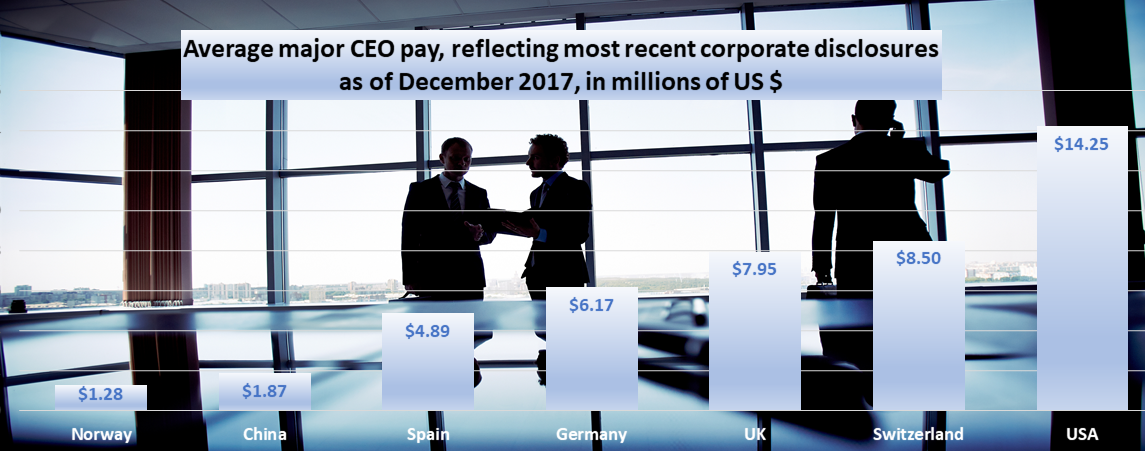
Apologists for the many millions in compensation that America’s largest corporations regularly dole out to their top executives have essentially one basic, all-purpose go-to defense.
America’s corporate giants, this defense contends, are just paying the going “market rate” for top-notch executive talent. So chill out, America. Average Americans who complain about excessive executive pay, says Stanford Business School’s Nick Donatiello, simply do not realize “how much compensation is required, given the market for talent, to attract and motivate the right people.”
Any company that tries to go cheap and get by without that “right talent,” America’s corporate wisdom continues, would never be able to successfully compete in our globalized marketplace.
Does this defense hold any water? Not any more. Business analysts at Bloomberg have now forever scorched the notion that American CEO pay somehow reflects “market” reality. These analysts have just released the best comparative data yet on what companies that compete successfully in the global marketplace are actually shelling out for corporate executive compensation.
The Bloomberg researchers looked worldwide at major corporations of similar size and heft. In all, the researchers examined corporate pay records in 22 nations. In not one of these nations, Bloomberg found, do the executives of top-line firms make anything close to the paychecks of America’s corporate execs.
In fact, America’s top corporate executives are taking home, on average, quadruple the average CEO pay that comparable top execs in the rest of the world are making.
If this huge pay difference simply reflected a “marketplace” judgment on the sheer talent of America’s top execs, top U.S. corporations would be totally dominating global markets, outselling their foreign rivals by wide margins in everything from cars to computers.
U.S. corporations are doing no such thing, of course. In one key global market sector after another, foreign corporations that pay their CEOs much less than U.S. CEOs are running neck and neck with their U.S. counterparts — and often leading the pack.
The global marketplace, in other words, hardly seems to be demanding that top executives take home $14.25 million each, the current average pay Bloomberg researchers calculate for major U.S. corporate chiefs.
CEOs in no other nations come anywhere near that $14.25-million level. America’s peer nations in the global marketplace are shelling out, on average, $3.55 million for top execs.
In Switzerland, the second-highest nation on Bloomberg’s CEO pay scale, top executives are pulling down $8.5 million a year, not much over half the going-rate for top U.S. execs. In Germany, home to many of the world’s most successful companies, CEOs average $6.17 million.
The Bloomberg researchers have also been comparing what CEOs receive to the compensation that goes to average workers. They have found a similar story. No nation has as wide a CEO-worker pay gap as the United States.
Top U.S. CEOs are taking home 265 times what U.S. workers are making, the Bloomberg analysts note. Comparable German CEOs are outpacing German workers by 174 times. The gap in Australia: 140 times.
The world’s narrowest gap between CEO and worker pay, not surprisingly, resides in one of the world’s most equal nations. In Norway, major corporate CEOs are averaging just $1.28 million in compensation, the income of about 20 average Norwegians.
In the U.K., the only developed nation besides the United States with a CEO-worker pay ratio over 200 times, even conservative politicians have been railing against excessive executive compensation. Prime minister Theresa May’s conservative government has moved to require that Britain’s 9,000 publicly traded companies start disclosing, later this year, the pay ratios between their top executives and average workers.
The U.K. opposition Labour Party wants to go considerably further. If elected into power, Labour’s top business matters spokesperson has just pledged, the party will place a special tax on excessive corporate executive compensation and require businesses bidding for public contracts to have a CEO-worker pay ratio no wider than 20:1.
Labor leaders like Tim Roache, the general secretary of one of the U.K.’s largest unions, are welcoming that pledge. Top execs in the U.K., Roache observes, made more in the first three days of 2018 than average British workers will make over the course of the entire year.
“Does anyone really think these fat cats,” asks Roache, “deserve 100 times more than the hard-working people who prop up their business empires?”
A question even more worth asking in the US of A.
3 WAYS TO SHOW YOUR SUPPORT
- Log in to post comments














